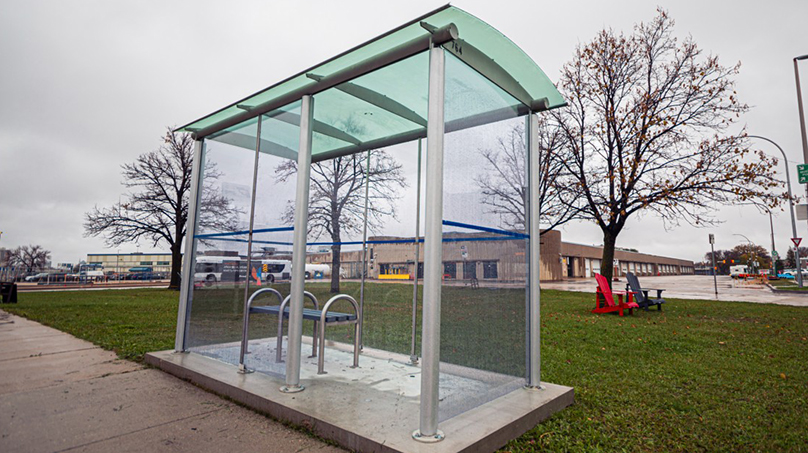
We're taking steps to address shelter vandalism.
This fall, we’ll install damage-resistant polycarbonate at 30 high-use shelters across the city.
The goal of this pilot is to reduce vandalism and make our shelters consistently safe and usable for all Winnipeggers.
Dangerous and expensive
It’s no secret that shelter vandalism has been an ongoing issue for years.
Since 2020, vandals have destroyed glass panels at hundreds of shelters. During that time, we have spent more than $1 million replacing broken glass.
Our facilities staff see the impact of this vandalism every day. They often clean broken glass and install new panes at the same shelters multiple times a year.
We've also heard it from the public, who contact 311 to let us know about broken glass and unsafe shelter conditions.
Broken shelter glass creates dangerous situations for riders and non-riders alike. It also makes our shelters unusable. This is evident during the winter when riders need protection from the elements.
It's time for a change.
What makes polycarbonate different?
Polycarbonate is already used by transit agencies across Canada. It's also utilized on storefronts, outdoor signage, and drive-through displays.
This damage-resistant alternative has been lab tested for UV, chemical, and weather resistance. It's also only 15 percent more expensive than our current shelter glass. That meant we were able to expand the pilot this year to include more shelters than expected.
While polycarbonate is not indestructible, it is much stronger than safety glass. Polycarbonate is approximately 250 times more resistant to impact than our current glass and, if it pops out of the shelter frame, it won't shatter. Instead of cleaning up broken glass, our crews will be able to put the pane back into the frame.
Preparing for winter
From September 24 to October 15, we dedicated two trucks and personnel to installing polycarbonate and replacing glass at shelters. In total, our crews:
• Visited 101 bus shelters across the city
• Repaired glass in 70 shelters
• Completely outfitted three shelters with polycarbonate
We are continuing this work throughout the fall. We have six shelters scheduled every day for glass repairs or polycarbonate installs.
What's next?
The first step is installing polycarbonate at all 30 shelters before the end of the year.
During the winter months, we'll evaluate the on-street performance of these panels. We hope the glass performs similarly to what was measured during lab testing.
If the results are positive, we will buy more polycarbonate in 2026. Our goal is to install this damage-resistant product at all our shelters in the city.
